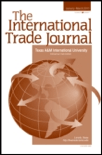
International Trade Journal
Scope & Guideline
Advancing knowledge in global commerce.
Introduction
Aims and Scopes
- Trade Policy Analysis:
The journal encompasses research that critically analyzes various trade policies, including tariffs, trade agreements, and regulations, assessing their implications for economies at both macro and micro levels. - Impact of Globalization:
A significant focus is placed on the effects of globalization on trade flows, economic development, and inequality, highlighting how interconnected economies influence each other. - Foreign Direct Investment (FDI) and Trade Relations:
The journal publishes studies examining the relationship between FDI and trade, exploring how investments affect trade dynamics and economic growth in different regions. - Economic Complexity and Trade Performance:
Research on economic complexity and its impact on trade performance is highlighted, providing insights into how countries can enhance their trade competitiveness through diversification and innovation. - Regional Trade Agreements and Integration:
The journal addresses the implications of regional trade agreements and economic integration, analyzing their effects on trade patterns, economic growth, and policy development. - Environmental Sustainability in Trade:
There is a growing interest in the intersection of trade and environmental sustainability, with studies focusing on how trade practices can be aligned with sustainable development goals.
Trending and Emerging
- Digital Trade and E-commerce:
There is a significant increase in research exploring the implications of digital trade and e-commerce on international trade practices, especially in the context of the COVID-19 pandemic and subsequent shifts in consumer behavior. - Trade and Climate Change:
Emerging studies focus on the relationship between trade and climate change, examining how trade policies can be aligned with environmental sustainability goals and the economic impacts of climate-related regulations. - Global Supply Chain Dynamics:
Research on global supply chains is trending, particularly concerning disruptions caused by geopolitical tensions or global crises, and how these affect international trade patterns. - Trade and Income Inequality:
An increasing number of studies are investigating the links between trade, economic growth, and income inequality, highlighting the socio-economic implications of trade policies. - Multilateral Trade Relations:
There is a renewed interest in multilateral trade relations and their effectiveness, particularly in light of recent global trade tensions and the role of organizations like the WTO in facilitating trade.
Declining or Waning
- Traditional Trade Theories:
Research centered on classical trade theories such as comparative advantage appears to be less frequent, as scholars increasingly focus on more contemporary issues such as economic complexity and globalization impacts. - Simple Bilateral Trade Models:
There has been a noticeable decline in studies utilizing simplistic bilateral trade models, as the field moves toward more complex, multi-faceted analyses that consider a broader range of variables and interactions. - Static Economic Analysis:
Static analyses that do not account for dynamic changes in trade flows and policies are becoming less common, with researchers preferring dynamic models that better reflect real-world complexities. - Commodity-Specific Trade Studies:
The focus on specific commodities in trade research is diminishing, as scholars shift towards broader analyses that encompass multiple sectors and the interdependencies between them. - Focus on Developed Economies:
Research concentrating solely on developed economies is declining, with a growing emphasis on developing and emerging economies, reflecting the shifting landscape of global trade.
Similar Journals
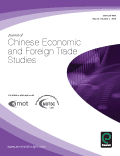
Journal of Chinese Economic and Foreign Trade Studies
Deciphering the Economic Tapestry of ChinaJournal of Chinese Economic and Foreign Trade Studies is a distinguished academic platform dedicated to exploring the intricate dynamics of China’s economic policies and foreign trade practices. Published by Emerald Group Publishing Ltd, this journal caters to a diverse readership interested in the intersection of business, economics, and international management. With an ISSN of 1754-4408 and an E-ISSN of 1754-4416, it demonstrates its influence in the scholarly community, evidenced by its latest categorization as a Q3 journal in Business and International Management and Q2 in Economics, Econometrics, and Finance for 2023. The journal’s rank of #67/288 in the Scopus database places it in the 76th percentile, affirming its significance in the field. Although it operates under traditional access models, the journal invites rigorous academic discourse and provides a vital source of knowledge for scholars interested in the evolving landscape of Chinese trade and economic strategies from 2010 to 2024.
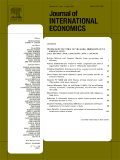
JOURNAL OF INTERNATIONAL ECONOMICS
Connecting researchers with cutting-edge economic findings.JOURNAL OF INTERNATIONAL ECONOMICS, published by ELSEVIER, stands at the forefront of advancing knowledge in the fields of economics and finance. With an esteemed Q1 ranking in both Economics and Econometrics and Finance categories, this journal has established itself as a premier platform for disseminating innovative research. Since its inception in 1971, the journal has provided critical insights into the dynamics of international economic interactions, making it essential reading for researchers, professionals, and students seeking to understand complex global economic issues. With access to high-quality, peer-reviewed articles, readers can stay abreast of the latest trends, methodologies, and empirical findings shaping the economic landscape. Based in the Netherlands, the journal continues to attract contributions from leading experts worldwide, with its rigorous selection process ensuring that only the most impactful research is published, further enhancing its significance in the academic community.
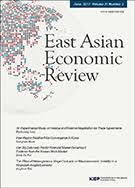
East Asian Economic Review
Advancing Knowledge on East Asian Economic Trends.East Asian Economic Review is a premier academic journal dedicated to the multifaceted exploration of economic issues and developments in East Asia. Published by the Korea Institute for International Economic Policy, this journal serves as a vital platform for researchers, practitioners, and policymakers interested in the region's economic dynamics. Since transitioning to Open Access in 2013, it has enhanced accessibility, allowing for a broader dissemination of knowledge and fostering collaborative research. While the journal currently does not have an impact factor rating, its commitment to high-quality research continues to attract contributions that significantly advance the understanding of economic policies, trade relations, and market trends in East Asia. The East Asian Economic Review stands out as an essential resource for anyone involved in or studying the intricate economic landscape of one of the world's most dynamic regions.
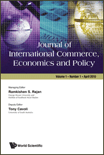
Journal of International Commerce Economics and Policy
Empowering Research in Commerce and Policy InnovationJournal of International Commerce Economics and Policy, published by WORLD SCIENTIFIC PUBL CO PTE LTD in Singapore, is a pivotal platform for interdisciplinary research that explores the dynamics of international commerce, economic theory, and policy formulation. With an ISSN of 1793-9933 and an E-ISSN of 1793-9941, the journal aims to disseminate significant insights contributing to the understanding of global economic frameworks and trade practices. It ranks in the Q3 category across various fields, including Business, Management and Accounting, Economics and Econometrics, and Finance, signifying its role in advancing knowledge and dialogue in these critical areas. Spanning a convergence of years from 2010 to 2024, the journal not only serves as a resource for researchers and practitioners but also fosters a vibrant academic community dedicated to addressing contemporary challenges in international commerce and economic policy. With an emphasis on open access, this journal ensures that research findings remain accessible to a global audience, thereby enhancing the impact and reach of its published works.

Journal of Korea Trade
Illuminating the pathways of Korea's trade policies.The Journal of Korea Trade, published by the KOREA TRADE RESEARCH ASSOC, is a pivotal academic platform dedicated to advancing knowledge in the fields of business, international management, and economics. Although coverage in Scopus has been discontinued since 2021, the journal maintains an essential role in disseminating research that explores trade dynamics, economic policies, and their implications within the global market. Based in the United Kingdom, it serves as a resource for researchers, professionals, and students seeking to deepen their understanding of Korea's trade landscape, despite its current Q4 rankings across various business and economic categories. The journal's aim is to foster interdisciplinary dialogue and present empirical studies that contribute to both theoretical frameworks and practical applications. As an open-access journal, it strives to enhance accessibility to significant trade research, ensuring that valuable insights reach a wider audience and help inform policy decisions. This commitment to knowledge dissemination is integral in a rapidly evolving economic environment.

Global Economic Review
Fostering a deeper understanding of global economic issues.Global Economic Review, published by ROUTLEDGE JOURNALS, TAYLOR & FRANCIS LTD, is a pivotal academic journal that serves the fields of Business, International Management, Economics, Econometrics, and Political Science. With an ISSN of 1226-508X and an E-ISSN of 1744-3873, this esteemed journal has been disseminating vital economic research since 1996, and is set to continue until 2024. The journal holds a notable presence in academic circles, achieving a Q3 quartile ranking in the 2023 category assessments across various disciplines, including Business and International Management, Economics, and Political Science. Notably, it ranks in the top 60th percentile for Political Science and International Relations, showcasing its significant contribution to the discourse within the social sciences. Although not an open-access publication, the Global Economic Review remains accessible to a wide range of researchers, professionals, and students, acting as a critical platform for innovative and impactful economic ideas. Its rigorous peer-review process ensures the publication of high-quality research that responds to the challenges of a rapidly evolving global economy. Scholars seeking to engage with pertinent economic issues will find this journal to be an invaluable resource.
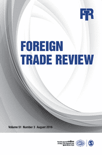
Foreign Trade Review
Fostering Scholarly Dialogue in Trade and EconomicsForeign Trade Review, published by SAGE Publications India Pvt Ltd, represents a pivotal platform for scholarly discourse in the realms of International Trade, Business, and Economics. With an ISSN of 0015-7325 and E-ISSN 0971-7625, this esteemed journal has been serving the academic community since 1966, and continues to influence thought leadership in its converged years through 2024. As a leader in its field, it holds a respectable Q2 ranking in both Business and International Management and Economics, Econometrics and Finance, alongside a Q3 ranking in Marketing for 2023. The Scopus ranking further cements its noteworthy position, placed within the 68th percentile for general economics and 45th percentile for business management. Although the journal does not offer open access, it is invaluable for researchers, professionals, and students who seek to enrich their understanding of foreign trade dynamics and their implications. The contributions made in this journal not only support academic rigor but also enhance practical applications of trade policies and international economic strategies.

INTERNATIONAL ECONOMICS AND ECONOMIC POLICY
Empowering Research to Inform Economic Decision-MakingINTERNATIONAL ECONOMICS AND ECONOMIC POLICY, published by Springer Heidelberg, is a pivotal journal in the field of economics, focusing on both theoretical and empirical research that addresses pressing international economic issues. With an ISSN of 1612-4804 and an E-ISSN of 1612-4812, this journal has been a reliable source of insights since its inception and is poised for continuous growth, converging its themes from 2005 to 2024. Ranked in the Q2 category of Economics and Econometrics in 2023, it stands at a commendable 63rd percentile among similar journals, emphasizing its significance and impact in the academic community. Located in Heidelberg, Germany, the journal provides an access portal for researchers, professionals, and students to engage with cutting-edge economic analyses that inform policy and practice globally. By publishing original articles, reviews, and policy discussions, INTERNATIONAL ECONOMICS AND ECONOMIC POLICY plays a crucial role in shaping the discourse within the global economics landscape.

Journal of Economic Integration
Navigating the Complexities of Economic Integration.The Journal of Economic Integration, published by Sejong University Center for International Economics, stands as a pivotal forum for scholarly discourse in the field of economics, particularly focusing on the interwoven dimensions of economic systems and integration processes. With an ISSN of 1225-651X and an E-ISSN of 1976-5525, this journal plays a crucial role in disseminating high-quality research that navigates both theoretical frameworks and empirical studies, appealing to researchers and practitioners alike. Regarded as a Q2 journal in the Economics, Econometrics and Finance category for 2023, it ranks 100th out of 288 in Scopus, reflecting its significant competitive standing in the field. The journal encourages contributions that explore the implications of economic policies and integration on global and regional scales, fostering a deeper understanding of challenges and opportunities arising from economic collaboration. Published biannually from 2013 to 2024, it aims to bridge gaps in knowledge while promoting critical analysis and discussions among academics, policymakers, and students. This makes the Journal of Economic Integration an indispensable resource for anyone engaged in the dynamic field of economics.

Pacific Economic Review
Fostering Dialogue Across Economic Disciplines.Pacific Economic Review, published by WILEY, is a prestigious academic journal dedicated to the exploration of economic issues within the Pacific region, including interdisciplinary perspectives across Aerospace Engineering, Development, and Geography, Planning, and Development. With its ISSN 1361-374X and E-ISSN 1468-0106, this journal has established itself as a crucial platform for disseminating high-quality research, evident in its categorization in Q2 across multiple fields for 2023. Researchers and professionals aiming to contribute to the understanding of economic dynamics—especially those affecting the Pacific context—will find this journal an invaluable resource. Even without open access options, the journal provides extensive insights through its articles and has a commendable ranking in Scopus, ranked #329/716 in the Economics and Econometrics category, placing it in the 54th percentile. Through the convergence of knowledge from diverse fields from its inception in 1996 to the present, the Pacific Economic Review serves as a vital conduit for scholarly dialogue and innovative solutions to economic challenges.